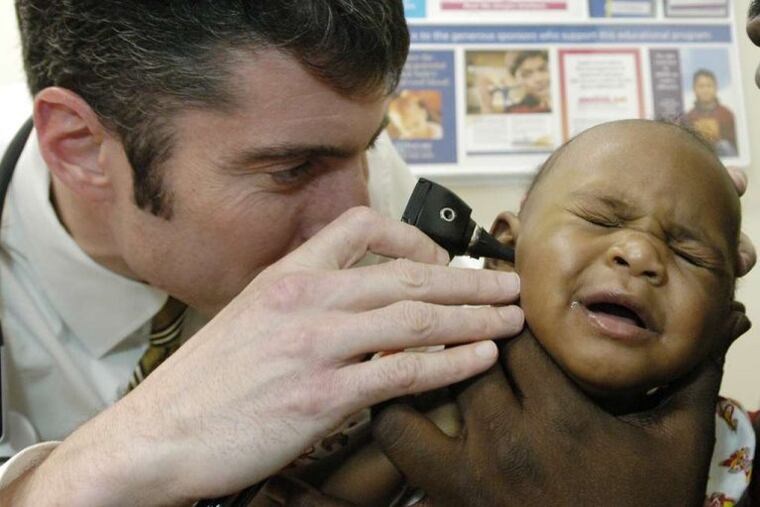A pediatrician's view: What will proposed GOP cuts do to Philly's most vulnerable?
As GOP spending cuts make their way through Congress, a busy doctor looks at his day's schedule and thinks how each of his patients and their families might be affected.

It's a rainy weekday morning in North Philadelphia, and once again, as I have been doing for the last 15 years, I sign on to our electronic health-records database and prepare for the 26 young patients, ages 1 month to 20 years, on my schedule. It's a few days after the White House's 2018 budget proposal, "A New Foundation for American Greatness," was released last month.
Most of my patients are on Medicaid, although I also check to see whether any have insurance benefits such as discounted gym memberships, a big help for low-income families struggling with obesity.
Reviewing clinical notes, I'm reminded that several of the families have what's known as food insecurity, which simply means they don't have enough money to be certain their children can eat well. That's not uncommon here in North Philadelphia. I make sure that our social services team has addressed this in previous visits, looking for chart notations such as: "family receives SNAP benefits" (food stamps), or "gets TANF" (Temporary Assistance for Needy Families).
I see a previous note in one infant's chart reminding me to check whether his mother was able to get a subsidy to help pay for good-quality day care, vitally important for this child's early brain development as well as getting the mother back to work.
I make a note to check with a family that has two children with asthma. The family applied for help through the Low Income Home Energy Assistance Program and for a grant to help with essential home repairs so the kids' conditions — asthma is exacerbated by environmental conditions such as mold — don't get any worse. Trying to stretch the family income to cover home-repair costs has only been contributing to the "heat-or-eat" phenomenon that many families in poverty face.
Two other families on my schedule depend on Social Security disability benefits they receive for their special-needs children to make ends meet. With the children's complex needs, it would be very difficult for their parents to work outside the home.
The last child on my schedule has a teen mother. She is now on long-term birth control to avoid the obvious perils of needing to take daily pills, and is razor-focused on graduating high school and being "successful" for her baby.
Pediatricians and primary-care physicians are responsible for coordinating the overall health of their patients, which in my world also means nutrition counseling, home maintenance, self-care issues, and family dynamics. Add to the list counseling parents on their children's growth, behavior, development, safety, and immunizations and routine screening tests. This must all be done in 15-minute appointments; 20 to 30 times a day a provider.
The community we serve is the epicenter of childhood poverty in the city with the greatest concentration of poverty in the nation. As studies have shown, a child born in the zip codes we mainly serve can expect an average lifespan as much as 20 years less than a child born in the city's more affluent neighborhoods.
So as "A New Foundation for American Greatness" is making its way to Congress — and as senators quietly ponder the American Health Care Act to replace the Affordable Care Act, I pause briefly to think about the potential effects on the families I am about to see.
The president of the Children's Defense Fund, Marian Wright Edelman, has labeled the budget a "War on Children" that "cruelly dismantles and shreds America's safety net laboriously woven over the last half-century to help and give hope to the 14.5 million children struggling today in a sea of poverty, hunger, sickness, miseducation, homelessness and disabilities."
The budget calls for reductions in programs that help my patients and their families afford housing, food, and education. It calls for $40 billion in cuts to tax credits for lower-income families such as the Earned Income Tax Credit and Child Tax Credit, as well as massive cuts to TANF. It calls for $193 billion in cuts over 10 years to the SNAP program that helps feed most of the families I care for and $72 billion in cuts over 10 years to the Supplemental Security Income Program that so many families with disabled children count on to survive.
It would cut billions from housing and utility programs that almost 7 million Americans depend on to keep their families warm during the winter. It would end family-planning services that many women depend on both to limit their family size and to get primary health care themselves.
It calls for cuts of $1.6 trillion over 10 years in life-altering programs such as job training, quality education, and housing vouchers programs that help raise families out of poverty. It calls for an $880 billion-dollar cut to Medicaid, which half of all Pennsylvania children depend on to keep them healthy, safe, and secure.
I wonder about the implications of this budget on our city. Will the 20-year life-expectancy gap grow even wider?
I am jolted back to my day as the computer alerts me that my first patient, a beautiful 2-month-old girl, who depends entirely on the loving care of her mother and the support of society, is ready for me. Are we ready for her?
Daniel R. Taylor, D.O., is an associate professor at Drexel University College of Medicine and director of community pediatrics and child advocacy at St. Christopher's Hospital for Children.